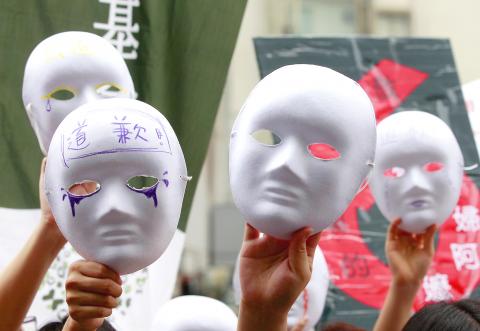Rights advocacy groups demonstrated outside the Japanese representative office in Taipei yesterday morning as part of globally coordinated action to demand that the Japanese government apologize and pay compensation to those forced to serve as military comfort women during World War II.
Holding placards condemning Japanese politicians — including Japanese Prime Minister Shinzo Abe, Deputy Prime Minister Taro Aso, Okasa Mayor Toru Hashimoto and Representative Shintaro Ishihara — for denying or playing down the comfort women issue, more than 100 demonstrators joined their partners in the US, Canada, Germany, South Korea, the Philippines and Japan in demanding that the Japanese government apologize and compensate women forced to serve in military brothels during World War II.
“We are here — as we have been in past years — to demand that the Japanese government formally apologize to and compensate comfort women,” Taipei Women’s Rescue Foundation executive director Kang Shu-hua (康淑華) said. “The Japanese government is both legally and morally responsible for the sexual exploitation.”

Photo: Pichi Chuang, Reuters
Kang said that as many as 2,000 Taiwanese women were forced to work in Japanese military brothels and that there are only six left alive — one of them is 92 years old, while the others are in their 80s.
“They have waited for all these years for an apology, how long do they still have to wait?” she asked.
Taiwan Women’s Link president Huang Sue-ying (黃淑英) said that forcing the women to suffer sexual exploitation and abuse was a war crime.
“You [the Japanese government] are wrong if you think the injustice will be buried with these former comfort women when they are all gone,” Huang said. “Generations of Taiwanese will continue to fight for justice for them, as long as we are still around.”
Labor Rights Association chairwoman Wang Chuan-ping (王娟萍) accused Japanese politicians who twist history of being accomplices in a war crime.
An official from the Japan Interchange Association’s General Affairs Department came out to receive the petition, but demonstrators questioned the sincerity of the office as it sent a lower-ranking official to receive the petition.
With the crowd chanting “apologize” and “representative, come out,” the association eventually sent Deputy Representative Yukuke Sami to receive the petition.
Three demands were listed in the petition — that the Japanese prime minister apologize to the comfort women on behalf of the Japanese government, with an endorsement from parliament; the Japanese government should recognize the fact that there were comfort women who were forced to work at military brothels and should never change its stance on the issue; and that Japan should have legislation prohibiting remarks that twist the facts about the comfort women.
The crowd vowed to return next year if the Japanese government fails to respond positively to the demands.

Alain Robert, known as the "French Spider-Man," praised Alex Honnold as exceptionally well-prepared after the US climber completed a free solo ascent of Taipei 101 yesterday. Robert said Honnold's ascent of the 508m-tall skyscraper in just more than one-and-a-half hours without using safety ropes or equipment was a remarkable achievement. "This is my life," he said in an interview conducted in French, adding that he liked the feeling of being "on the edge of danger." The 63-year-old Frenchman climbed Taipei 101 using ropes in December 2004, taking about four hours to reach the top. On a one-to-10 scale of difficulty, Robert said Taipei 101

Nipah virus infection is to be officially listed as a category 5 notifiable infectious disease in Taiwan in March, while clinical treatment guidelines are being formulated, the Centers for Disease Control (CDC) said yesterday. With Nipah infections being reported in other countries and considering its relatively high fatality rate, the centers on Jan. 16 announced that it would be listed as a notifiable infectious disease to bolster the nation’s systematic early warning system and increase public awareness, the CDC said. Bangladesh reported four fatal cases last year in separate districts, with three linked to raw date palm sap consumption, CDC Epidemic Intelligence

US climber Alex Honnold left Taiwan this morning a day after completing a free-solo ascent of Taipei 101, a feat that drew cheers from onlookers and gained widespread international attention. Honnold yesterday scaled the 101-story skyscraper without a rope or safety harness. The climb — the highest urban free-solo ascent ever attempted — took just more than 90 minutes and was streamed live on Netflix. It was covered by major international news outlets including CNN, the New York Times, the Guardian and the Wall Street Journal. As Honnold prepared to leave Taiwan today, he attracted a crowd when he and his wife, Sanni,

Taiwanese and US defense groups are collaborating to introduce deployable, semi-autonomous manufacturing systems for drones and components in a boost to the nation’s supply chain resilience. Taiwan’s G-Tech Optroelectronics Corp subsidiary GTOC and the US’ Aerkomm Inc on Friday announced an agreement with fellow US-based Firestorm Lab to adopt the latter’s xCell, a technology featuring 3D printers fitted in 6.1m container units. The systems enable aerial platforms and parts to be produced in high volumes from dispersed nodes capable of rapid redeployment, to minimize the risk of enemy strikes and to meet field requirements, they said. Firestorm chief technology officer Ian Muceus said